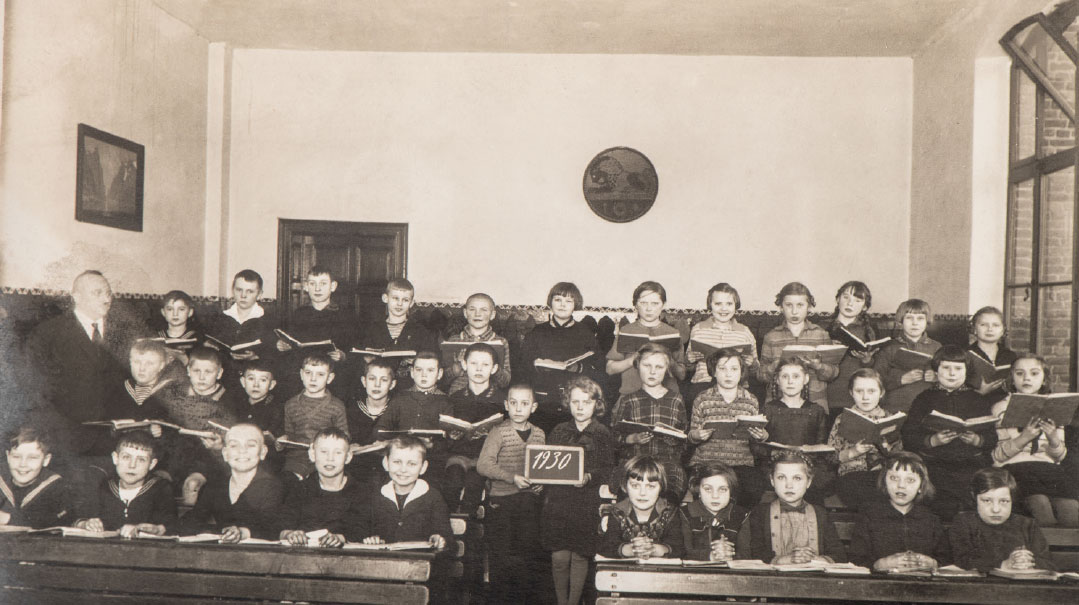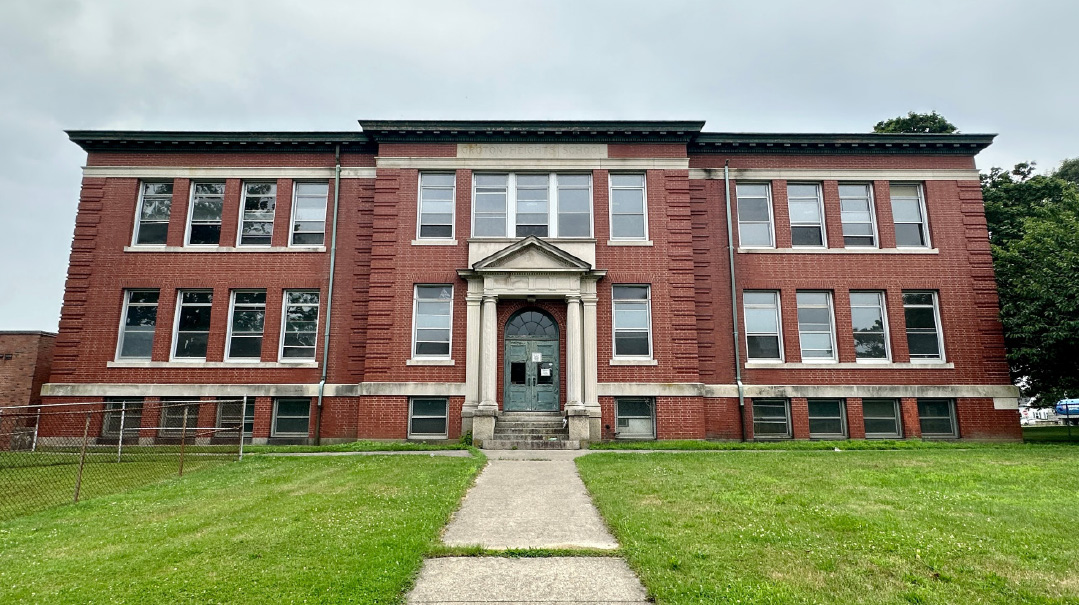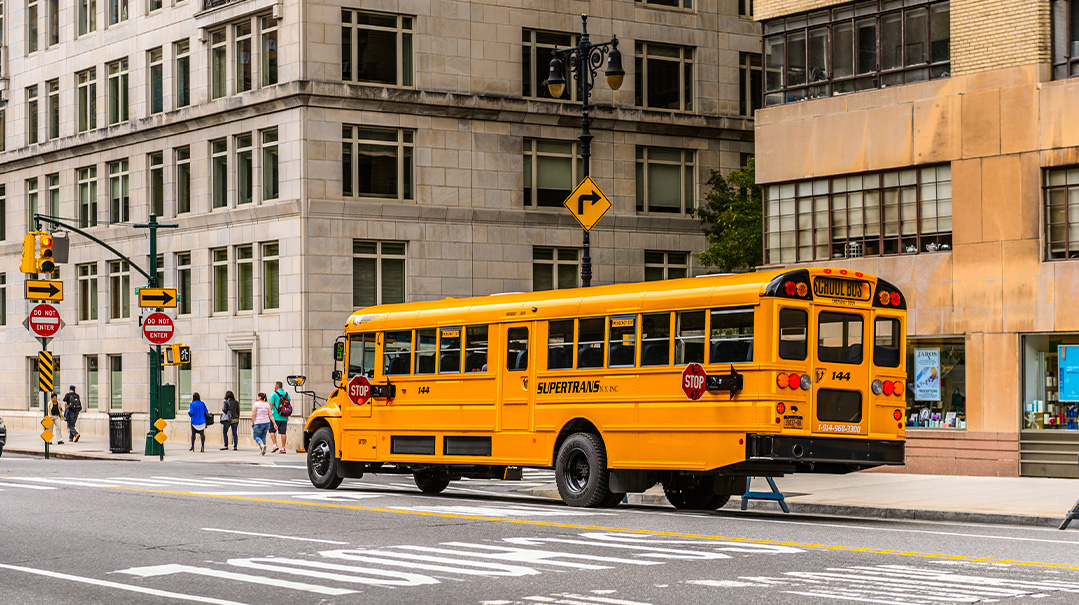Battering Blaine’s Bigotry

Bigoted Blaine amendments go, but yeshivah funding needs work

Old-school discrimination: a 1930s era New York public school
Every generation has its controversial law or Supreme Court ruling that history judges to be unfair. From Dred Scott to Jim Crow and the Alien and Sedition Acts, these are cases that may be meaningless to the uninitiated but carry along a truckload of pain for its victims.
For the religious school community, so-called Blaine amendments enacted in 38 states have for 150 years served as the albatross around the neck of parents struggling to pay tuition. The laws, which a court once memorably termed as “born in bigotry,” prohibit public funding of religious schools. The legislation was originally enacted as a discriminatory measure against Catholics, and was later used to prevent any funding of religious education by states.
Striking down Blaine became a top priority for lobby groups who advocated for religious schools. And last week, the Supreme Court delivered it a mortal blow, deciding in Espinoza v. Montana Department of Revenue that when a state provides a benefit to a private school, it must provide the same benefit to a religious school. In other words, a state cannot discriminate against a private school just because it is a religious institution.
“A State need not subsidize private education. But once a State decides to do so, it cannot disqualify some private schools solely because they are religious,” wrote Chief Justice John Roberts, joined by fellow conservative Justices Clarence Thomas, Samuel Alito, Neil Gorsuch, and Brett Kavanaugh in the 5–4 decision.
In the Jewish community, the initial reaction to the ruling was euphoric: Jewish parents might soon gain access to state funding for tuition. But on reflection, said a number of sources interviewed for this story, the ruling is certainly helpful but not revolutionary.
“There are people who read the headline and think we’re getting vouchers in New York tomorrow,” said Rabbi A.D. Motzen, the national director for state relations at Agudath Israel of America. “That’s because they don’t understand what it means. On the flip side, there are some people who say this doesn’t help us at all and we’re never going to get vouchers in New York. That’s also not true, because this really helps tremendously.”
Yehoshua Bedrick, the director of policy for EdChoice, a national organization promoting school choice, said the ruling will have the long-term effect of aiding state politicians who wish to help parents paying for religious schooling.
“The Blaine amendments were not explicitly struck down, but they were rendered impotent,” said Bedrick, a former New Hampshire representative and a Lubavitcher who lays claim to being the first chassidish person elected to state office. “There is still a lawsuit or two that will further clarify and amplify this.”
James Blaine, a Maine Republican who served as Speaker of the US House of Representatives, proposed a Constitution amendment in 1875 and won approval of the necessary three-quarters of the states. The House also overwhelmingly passed the measure, but it failed in the Senate by four votes. But in the more than three dozen states that adopted the amendment, it remained on the books.
Three years ago, the Supreme Court partially reined in Blaine when it ruled that a modest grant that Missouri provided for private schools to refurbish playgrounds must include religious schools as well. That ruling was heralded by school choice groups, but the celebration was muted for two reasons. One, not many states have playground renovation grants; and two, because of a footnote noting that the decision was limited to the playground at the school in question.
The latest ruling was different. Montana had established a program that provided tax credits to those who donate to programs that provide scholarships for private school tuition. The court’s ruling is also not limited to one school in particular but applies across the state. Other states can now use the ruling to change their Blaine-related policies toward religious school funding.
The ruling was greeted with seemingly unbridled excitement, with some form of “Blaine is dead” underlying them.
“Montana and other states,” said Education Secretary Betsy DeVos, probably private schools’ greatest advocate in that position in a half century, “should be very clear about this historic decision: Your bigoted Blaine amendments and other restrictions like them are unconstitutional, dead, and buried.”
Rabbi Motzen, a close DeVos ally, said he was on the conference call the education secretary held the day after the ruling with school-choice organizations. Asked what their next move is, he deadpanned: “A good advocate never telegraphs his next move.” But he added that he and his friends aim to take advantage of the watershed moment.
“We will be looking, in every state and possibly on the local level, at any rule or law that treats differently or discriminates against a school because of its religious status,” he said.
As it stands, Bedrick said, the ruling will have little impact on states such as New York, where powerful teachers unions oppose any private school funding and chronic budget shortfalls limit spending for education.
“New York, New Jersey, California — the issue in these states is not that there is a constitutional obstacle to passing a school-choice law, it is that there is a great deal of political opposition to it,” he said. “And this decision does nothing to change that calculus.”
But there are other cases that could further chip away at Blaine that court observers are watching closely. There is a pending case in Maine dealing with vouchers provided to students that can be used in private but not religious schools. Courts in Michigan are also looking at laws that reimburse religious schools for health and safety programs. In each state there are impediments, but the Espinoza ruling could change the dynamic.
To do that, Bedrick said, courts would have to take the Roberts doctrine a step further and say that the constitution does not require the federal government to fund education generally, but if it does, it must fund all systems equally, including public, private, and religious. He acknowledged that as of now, a broad ruling like that is a distant possibility.
But times are changing, he noted. About 20 years ago, a case before the Supreme Court revolved around whether a state may fund religious schools. “And now, 20 years later, the question isn’t whether that’s allowed — that’s clear,” Bedrick said. “The question is if they fund private school must they fund religious schools as well. And the answer is in the affirmative.”
This, he said, would help in states with existing voucher programs that are the target of suits by anti-school-choice advocacy groups like Florida, Colorado, and Bedrick’s adopted home state of Arizona.
“Tell your readers,” Bedrick added, “that the housing market is great in Arizona.”
(Originally featured in Mishpacha, Issue 818)
Oops! We could not locate your form.












